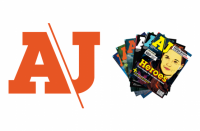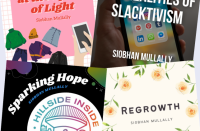AT OUR HOUSE, Alternatives is a keeper; as with great cookbooks, we mark up our favourite articles and save them for future reference. I also keep Orion’s gorgeous photos and impassioned essays, and together, the sumptuous American magazine and its savvy northern cousin keep my family on a balanced diet of smart environmental thinking.
AT OUR HOUSE, Alternatives is a keeper; as with great cookbooks, we mark up our favourite articles and save them for future reference. I also keep Orion’s gorgeous photos and impassioned essays, and together, the sumptuous American magazine and its savvy northern cousin keep my family on a balanced diet of smart environmental thinking.
Still, when I want lasting nourishment I turn to books. Magazines, like newspapers and the web, connect me to the conversation grid, but they can’t replace the staying power, the gravitas, of books. That’s why I’m staring down the recession by beefing up my booklist.
“Poets and storytellers can’t save the planet,” my son says as he sighs. (He’s reading President Obama’s memoir.) I tell him that if Canada’s domestic agenda is finally greening up, I want to use this downturn to rethink, to contemplate.
He’s wary of my strategy, and rightly so. At the moment, with the economy tanking, we need solutions, and fast. It’s time to network with other activists so that we can tackle the hard issues head-on. Alternatives and thegreenpages.ca are great resources for exactly this, because they’re fair-minded, sensible, pragmatic, and Canadians love this kind of talk – talk that delivers, unlike mind-numbing abstractions or poetic drivel. In fact, most activists I know are thrilled with this drive towards change. They want nothing more than to keep up the momentum.
But is narrowing our focus to solutions really where we want to go? I wonder. Isn’t vision even more critical in these darkening times? We’re not reaching for solutions when we read Thoreau, for instance. The genius of works like Walden is that they speak to a deeper hunger: the need for sustenance, perspective, the need to test ourselves against a first-rate mind.
If it matters where we’re headed as a country, then it matters what we ingest along the way. What we read – or don’t – affects what each of us can bring to the table, and these offerings in turn shape the lifestyle choices and sacrifices we make. To have the kind of vigorous public debate we need, we have to make room for extraordinary voices, not only those who generate solutions, but also those who represent other modes of thinking and seeing, other ways of being in the world.
At least this diversity appeals to members of the Association for Literature, Environment, and Culture in Canada, who seem to be devouring “artistic, critical and cultural studies work on activism, animals, ecology, the environment, environmental justice, geography, land, landscape, mountain literature and culture, nature and nature writing, natural history writing, plants, region, regionalism, the rural, sense of place, trans-border environmental issues, wilderness and wilder places, and much more.”
Not many holes in their reading list.
Most of us, however, get our tips at the water cooler or strolling through bookstores, so here’s a case in point. Last fall, I was eyeing the Environment titles – shelved in a solitary bookstand under the Nature section – at my local Chapters, where I discovered Going Home, Tim Lilburn’s latest book. A bold move, I thought, stashing an award-winning poet between Rocks & Minerals and Nature Stories. In any case, I was keen to read his essays, so I opened it up to the title chapter: “What we must learn is not geography, not an environmental ethics, not a land-benign economics, not a history, not respect, but a style that is so much ear, so attentive, it cannot step away from its listening…. It thus can’t be taught.”
Lilburn is not a writer you can digest in one sitting. His prose stuns, invigorates, delivers a bright, bitter strain of Western mysticism that includes Plato and The Cloud of Unknowing – not exactly standard reading in environmental literature.
“And why not?” I ask. Is it what poets say about ecology that’s so very difficult, or are we simply resistant to the art of listening? Are we, in fact, losing our appetite?
Books have been integral to Western culture for 1500 years, and by all measures, Canadians still consider them a staple. Even with drops in household income between 1998 and 2005, the average annual expenditure on books climbed from $86 to $111. In 2006, household spending slipped to $108 per annum, but Statistics Canada assures us that books are holding their own alongside magazines, newspapers, music and DVD consumption. Reading peaks by age 19; otherwise the best indicators of who reads books are high levels of education, disposable income and leisure time.
On the flip side, Statistics Canada also reports that 40 per cent of Canadians aren’t too keen on books. If that’s true, then one of the world’s most ostensibly advanced democracies is subsisting on a rather skimpy diet. Perhaps we’re just getting used to finger food and sound bites such as “shovel-ready.” Whatever else consumer trends may indicate, what’s alarming is this impatience with complexity – the long slow think.
Impatience, you may argue as my son does, is a good thing, a sign that we’re poised to act, to discard wishful thinking and esoteric queries. And if this is your position, then you are more sensible than I.
Then again, I’m not advocating the sensible and pragmatic. What I want is transformation: some deep-seated, soul-chilling change that resists the quick fix, the glib phrase, the false move. Without transformation, what kind of authentic, lasting change are we likely to achieve?
My son and daughter, like my students, are a little queasy in the face of such rank idealism. Fair enough, I say. Some day you’ll meet a writer who cracks open your senses by spearing the world’s soft dark underbelly. Then you’ll see.
A lot of people in this country with meaty reading lists are still hoping for some rich, savoury public dialogue between our poets, prophets and policy makers. But to even get them to the table, we may need to rethink what we mean by “green.” (I’m not sure that mixing literary essays with dog and cat tales is the way to go, but maybe it’s a start.)
Conventional modes of thinking just don’t cut it anymore. Statistics Canada reported on the green shift (the desire to change our ways) in its winter 2008 issue of “EnviroStats” by examining “six environmental behaviours at a household level.” The proactive measures studied included recycling, composting, installing low-flow showerheads and low-volume toilets, as well as turning down the thermostat. (Note: reading and writing about environmental issues do not yet figure as “behaviours.”) The results were that all these actions rose in proportion to increased education, income level and leisure time – the very same factors that correlate with book consumption.
So, if I persuade you to try fluorescent light bulbs, will you agree to read Tim Lilburn?
Incidentally, I dropped by Chapters in January to see if any of his books were left. Mine was one of seven, when I purchased it in October. It must have been near Halloween – there were skeletons dangling at the checkout.
“No one will ever find this beautiful book in the Nature section,” I ranted at the clerk. Then, as if it were an afterthought, I added, “Why not in Poetry or Literary Criticism?” She promptly checked her computer then swung the screen around, so I could see the verdict for myself. “Sorry, head office says to file in ‘Nature,’” she grimaced. “I can’t do anything about it.” Right, I thought, time to change my tone.
“Well, that’s forward thinking,” I added in my best sing-song voice, “I bet that, even as we speak, someone at head office wants to move the Environment section to front and centre in these stores.” The clerk stared blankly at my waving to the spot where the phantom stacks would stand. “All the surveys say the ‘environment’ is a big priority for Canadians,” I explained.
“Oh, yeah,” she laughed.
Now, three months later, since environmentalism has dropped far behind the economy, there are six Lilburn books (I have the seventh, remember) tucked side-by-side in Environment, which is still moored between Rocks & Minerals and Nature Stories in a grouping of three modest bookstands at the rear of the store, handy to the pay phones.
I sighed and shook my head, then turned to wend my way through the Food section, for a point of comparison. Just as I suspected: there they stood, row upon row of cookbooks. International, Vegetarian, Beverages, Desserts…on and on the headings went, towering stand after stand of luscious volumes filled with tasty remedies to stave off despair. There was no shelving shortage either; I lost count at 17.
“We are living in the midst of a great potluck at which we are all the invited guests,” Gary Snyder writes in Back on the Fire. “And we are also eventually the meal.”
I’m adding Gary Snyder to my book list.
Et tu?
Susan Scott, a contributing editor for The New Quarterly: Canadian Writers and Writing, can often be found lurking in the Nature section of her local Chapters.












